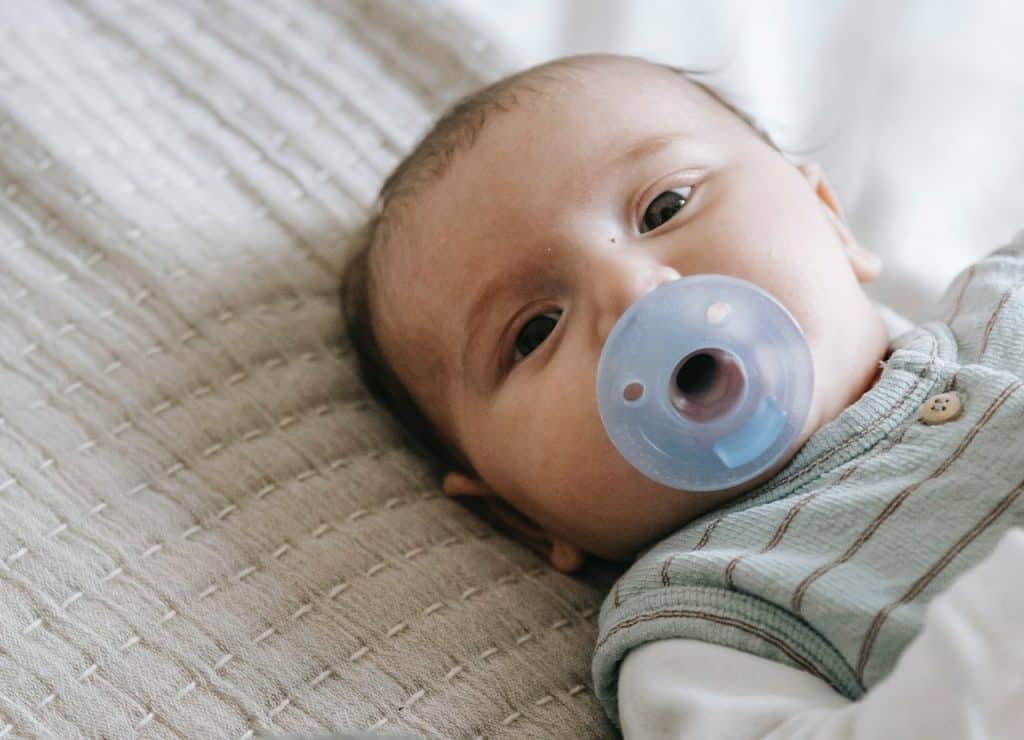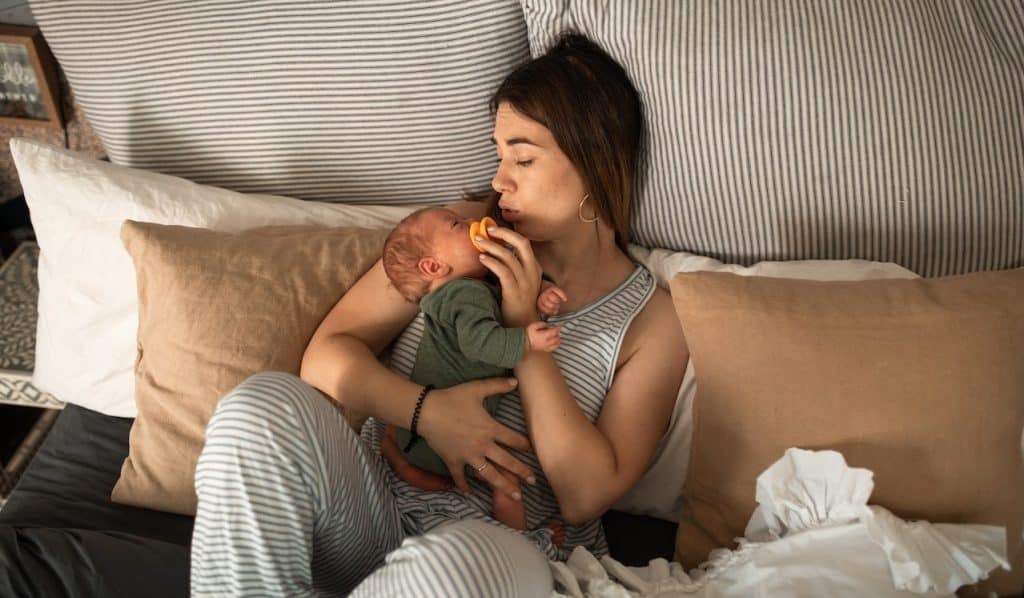Pacifiers can be lifesavers! Whether they are used to calm your fussy baby, help your toddler out of a meltdown, or help you all get a little more sleep, a pacifier can be a very helpful tool.
However, many parents view the prospect of a pacifier, binky, or soother, as they are often called as a source of anxiety or fear they may be contributing to their children developing a sleep prop.
Knowing the benefits of using a pacifier, while also being aware of the possible solutions before problems arise, such as when your newborn cries when their pacifier falls out during the night, can provide you with peace of mind as you decide whether to introduce one to your child.
Positive Uses for a Pacifier

Promotes Non-Nutritive Sucking
Newborns are naturally driven to suck, especially after eating. Non-nutritive suckling is the suckling of anything other than fluid. It is considered a normal part of fetal and newborn behavior.
It is estimated that fetuses begin sucking and swallowing movements between 13-16 weeks in the womb, which is a life-sustaining act necessary upon birth.
While babies are constantly introducing things into their mouths to learn about the world, sucking on a pacifier or thumb also provides some comfort and relaxation for them. The act also releases endorphins to the brain, resulting in a happy, secure baby.
Prevents SIDS
According to the American Academy of Pediatricians (AAP), Sudden Infant Death Syndrome (SIDS) is the unexplained death, usually during sleep, of children under the age of one.
According to their recommendations, newborns should:
- Sleep on their backs on a firm, flat surface
- Sleep in their parent’s room, close to their bed, but on a separate surface, at least for the first six months
- Not sleep with soft objects, such as pillows, plush toys, quilts, comforters, mattress toppers, fur-like items, or loose bedding
- Not overheat
- Not bed-share
- Not be around smoke or drugs
The AAP also recommends the use of a pacifier on newborns, further explaining that pacifier use should be delayed in nursing infants until breastfeeding has been established. The goal here is to avoid “nipple confusion” where the baby has issues breastfeeding due to the use of a pacifier or bottle.
However, a study published in the Journal of Family Practice found that mothers who introduce a pacifier while nursing are just as successful as those who abstain from using one.
Consequently, allowing your baby to use a pacifier, whether or not you are nursing, can have a positive effect on preventing SIDS.
Allows You to Night Ween
If your child is used to nursing to being able to fall asleep, a pacifier may help you ween them off the night feedings.
If your baby is hungry, do not offer them a pacifier instead of feeding them. This will not satisfy them and will leave you with a very cranky baby.
As an alternative, move their feeding time earlier and offer the pacifier as they’re ready to fall asleep. Over time, they will get used to the new schedule and will not require nursing to be able to sleep. It may help to know that at about six months, most infants can go more than eight hours without feeding at night.
Moreover, your spouse or significant other can provide the pacifier in your place since they are used to seeing you as the one who always feeds them.
Extend the Time Between Feedings
Whether you are running errands, are on a phone call, are stuck in traffic, or in an appointment that has gone too long, you may need a little more time before you can feed your baby.
During such moments, a pacifier may offer some temporary relief for your little one while you finish and tie up loose ends.
While you may not, and should not, postpone feeding times for too long, a pacifier may offer you an additional 10-15 minutes of relief.
Newborn Cries When Pacifier Falls Out (Solutions)
Sleep is essential for you and your baby. Although pacifiers can be excellent tools, they can also cause problems if your newborn cries when their pacifier falls out during the night, especially if this happens multiple times a night and they cannot reinsert themselves.
Moreover, a pacifier can become a problem if your child becomes dependent on it and begins to use it as a sleep prop.
There is no set time by which children should stop using a pacifier. However, most children use pacifiers until the age of one. Typically, you want to limit its use by age two and be completely done using it by age four.
If your child cannot sleep on their own or cannot self-soothe back to sleep without their pacifier, you may have to consider the following solutions.
-
Get the Right Size and Shape
Check to ensure you have the right nipple size and shape for a more secure hold. You may have to check it regularly as your baby grows.
Pacifier nipples can be flat, oval, or round. Their sizes may vary as well. You may have to do some trial and error to figure out what size and shape your baby prefers.
Don’t use nipples that are too big for your newborn’s mouth.
-
Pull It Right Before They Fall Asleep

If your baby keeps losing their pacifier during the night, you may try gently pulling it out just as they start falling asleep. Doing so will allow your baby to suck more intentionally and securely, reducing the chance of it falling out during the night.
Conversely, you may try taking it away completely right as they’re falling asleep. This may take a few tries, as your little one may suck it back in or may cry if you are successful at removing it.
In any case, it will take some patience and practice.
-
Use a Pacifier They Can Find in the Dark
For children who are older than one year of age (toddlers), you may want to use a pacifier they can find in the dark and reinsert themselves.
Stuffed animal pacifiers are ideal since they can lay them on their chest or can be held in their hands. Plus, a small stuffed animal is easier to find, even in the dark.
-
Don’t Go Back In
Unless your baby is teething or you are night weaning them, do not go back into their room when they cry because their pacifier fell out.
Although this can be very tough, by not going back in the room when they cry about their pacifier, you are allowing your child to self-soothe.
If you must go back in the room when your newborn cries when their pacifier falls out, then comfort your child in a different way, such as talking to them, singing softly, or lightly patting them until they fall asleep. You can acknowledge your baby without picking them up out of their crib or bed.
Whatever you choose to do, just be consistent.
-
Provide a Pacifier Replacement
If your child is old enough, where they’re past the risk of SIDS (over 1-year-old), you can offer a “security” object such as a soft toy or special blanket to help them go back to sleep.
This object can be provided as they go to sleep, along with their pacifier, so that when they awake crying because they’ve dropped their pacifier they can reach out for an “anchor” and continue into their deep sleep phase.
For infants under one year of age, sleep sacks with attached loveys, typically to the chest, can be a safe alternative since they won’t run the risk of suffocating on them.
-
Establish a Bedtime and Sleep Time Routine
Establishing a consistent bedtime and sleep time routine for your child, even at the infant stage, can forge positive sleep associations that can signal their little bodies to relax and go to sleep.
Set a calming routine, such as feeding, bath, books, and bed so that they’ll know to wind down naturally.
Furthermore, having a consistent sleep schedule teaches them when to expect sleep.
All in all, establishing a regular bedtime and sleep time routine can lead your child to be calm and relaxed, allowing them to sleep through the night.
Consistency is key.
-
Offer a Calm, Safe Environment
Providing a calm, dark, cool environment to sleep in can go a long way in making your child feel comfortable and safe. By providing an environment in which they can relax, children are more likely to fall asleep quickly and without distractions.
More importantly, they can stay asleep through the night, even with noise and dropped pacifiers as they sink into a deep sleep.
-
Quit Cold Turkey
When your child begins to throw their pacifier out of their crib or bed so that you’ll go in to get it for them, it is time to take it away as they no longer need it.
Likewise, if your newborn cries when their pacifier falls out several times a night and they cannot reinsert it themselves and cannot self-soothe, they might be developing a need for a sleep prop.
In such cases, removing the pacifier at once, with or without warning, maybe the best choice. Be prepared for tantrums and crying. Again, be consistent and don’t give in. Your child will get used to the new normal in a few days.
Final Thoughts
Deciding whether to introduce a pacifier to your child can come with anxiety and uncertainty. You may fear you will be enabling them to develop a sleep prop for the sake of your sanity or in hopes of getting a restful night.
However, there is no right or wrong in choosing to use pacifiers. There are many benefits to doing so. Knowing the possible solutions before problems arise can provide you with peace of mind as you endeavor into the pacifier realm.

